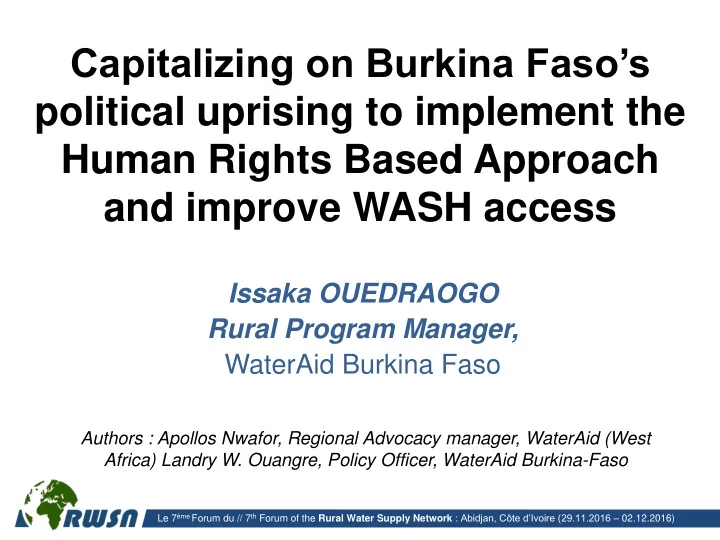

Capitalizing on Burkina Faso’s political uprising to implement the Human Rights Based Approach and improve WASH access Issaka OUEDRAOGO Rural Program Manager, WaterAid Burkina Faso Authors : Apollos Nwafor, Regional Advocacy manager, WaterAid (West Africa) Landry W. Ouangre, Policy Officer, WaterAid Burkina-Faso Le 7 ème Forum du // 7 th Forum of the Rural Water Supply Network : Abidjan, Côte d’Ivoire (29.11.2016 – 02.12.2016)
1: Introduction HRBA implementation in 8 pilot countries, including WABF Partnership with VARENA Asso and community organizations for local pilot actions Partnership with the department of justice and human rights for national advocacy Le 7 ème Forum du // 7 th Forum of the Rural Water Supply Network : Abidjan, Côte d’Ivoire (29.11.2016 – 02.12.2016)
2.Objectives Influence policies and stakeholders to ensure fulfillment of the rights of access to WASH of the poorest and most marginalized Provide capacity building to citizens on their rights and duties Support the continuous engagement between citizens and relevant duty- bearers Le 7 ème Forum du // 7 th Forum of the Rural Water Supply Network : Abidjan, Côte d’Ivoire (29.11.2016 – 02.12.2016)
3: Context Popular uprising that led to regime change and a new political leadership: Special Delegations (DS) also replaced the Municipal Councils New Government: Ministry of Water and Sanitation Strong and active civil society organizations People demanding more democracy, social justice and good governance Sanitation coverage: 34,2% (Urban) & 11,9% (Rural) Le 7 ème Forum du // 7 th Forum of the Rural Water Supply Network : Abidjan, Côte d’Ivoire (29.11.2016 – 02.12.2016)
4. Methods Advocacy (Campaigns and meetings) Writing of position papers and proposals on how to realize water and sanitation as human rights Capacity building ( partners, local CSO’s) Engagements with the parliament to improve its understanding of the rights to water and sanitation Raising communities’ awareness Development of a strategy for targeting vulnerable people by WABF Baseline situation including vulnerable people Le 7 ème Forum du // 7 th Forum of the Rural Water Supply Network : Abidjan, Côte d’Ivoire (29.11.2016 – 02.12.2016)
5. Results Recognition of the Human Rights to Water and Sanitation in the constitution Increased knowledge and empowerment of communities at local level Empowerment of the duty bearers – local, administrative and political authorities Local government engage with women; disabled persons org in budget process Le 7 ème Forum du // 7 th Forum of the Rural Water Supply Network : Abidjan, Côte d’Ivoire (29.11.2016 – 02.12.2016)
6. Analysis HRBA should be applied from the inception stage of programs People are the most important factor Community empowerment as a sustainability enabler A multi-stakeholder approach is needed to implement HRBA Building interest at the strategic and political level can be strengthened by use of evidence from the ground Le 7 ème Forum du // 7 th Forum of the Rural Water Supply Network : Abidjan, Côte d’Ivoire (29.11.2016 – 02.12.2016)
7. Discussion Application of HRBA is context specific Tools and approaches must be appropriate Apply at all level : rural, peri-urban, national, etc., Support to Vulnerable people organizations for their mainstreaming in other development sectors (health, education, etc.) Targeting the poor and marginalized: consensual methodology for targeting vulnerable people in Burkina Faso Le 7 ème Forum du // 7 th Forum of the Rural Water Supply Network : Abidjan, Côte d’Ivoire (29.11.2016 – 02.12.2016)
9. Lessons Learned The partnership with organizations of people with disabilities and their empowerment strengthen the HRBA Importance of continuous analysis with clear indicators to identify barriers to the effectiveness of the rights of vulnerable people Implementing HRBA in situations of Special Delegation is not appropriate Mapping inequalities helps to focus interventions on those who need it most Le 7 ème Forum du // 7 th Forum of the Rural Water Supply Network : Abidjan, Côte d’Ivoire (29.11.2016 – 02.12.2016)
9. Conclusion Continuous analysis is crucial - include specific focus on understanding systemic as well as operational issues connect local-level interventions to interventions at district, national, regional and vice-versa. When working for the rights of communities, also work on fostering their (and our) responsibilities – but we must first recognize the rights of rights-holders and the obligations of duty-bearers Partnership selection is crucial for effective HRBA work Le 7 ème Forum du // 7 th Forum of the Rural Water Supply Network : Abidjan, Côte d’Ivoire (29.11.2016 – 02.12.2016)
Thank you for your kind attention Le 7 ème Forum du // 7 th Forum of the Rural Water Supply Network : Abidjan, Côte d’Ivoire (29.11.2016 – 02.12.2016)
Recommend
More recommend